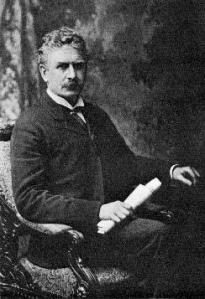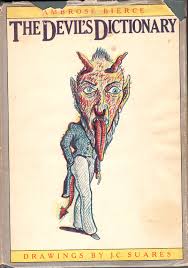I am sure that The Devil’s Dictionary by Ambrose Bierce is much better in its original form of 25 years of humorist and pithy definitions of words published in weekly newspapers. As a dictionary, read in a handful of sittings, it quickly becomes tedious. In the form of The Devil’s Dictionary, the collection of all of these sardonic defintions is an extended lexicon, covering many historical, philosophical, legal, and political issues. You would not likely find the word you searched for. I looked up all the dirty words without luck. I suppose it is meant to be skimmed through for a laugh. In this sense, it might make good toilet reading, or would function as a daily calendar of sardonic wit.
From reading The Devil’s Dictionary, I realize that while I can be cynical myself, meeting someone endlessly cynically would be quickly boring. Such people are best taken in small doses. Nevertheless, it is significant that the cynic, by opposing existing reality as much as possible veers close to an anarchist perspective. Bierce’s criticisms of capitalism, religion, governments of all types, classical traditions, intellectuals, and marriage are all spot on. Unfortunately, as a cynic, he is unable to offer up any alternative. Cynics are clever, but profoundly uncreative. To be truly creative, one needs to set aside the pessimism and the clever observations long enough to dream. For Lenin, the Russian Revolution was an opportunity to remake the world, and he did exactly that. How does Bierce define “opportunity”? “A favorable occasion for grasping a disappointment.” (571) For Bierce war is simply a “by-product of the arts of peace” (642) so why strive for peace? Resistance to authority if meaningless because “disobedience” is “the silver lining to the cloud of servitude.” (474) Cynicism may lead on toward a form of anarchism, but that form of anarchism is simply useless for any envisioning of alternatives. I often imagined Bierce as an Internet troll. That said, The Devil’s Dictionary is humorous and useful to consider in small bits. Bierce’s wit and cleverness is impressive.
I jotted down five themes that were heavily represented in The Devil’s Dictionary. This is not complete, of course. There does not seem to be any overarching target for the text, but we can group the majority of the defined terms into these seven categories. I will give you a brief taste of each, which as I suggested is the best way to read him.
1. Marriage. I wish I knew more about Bierce’s marriage. The same year he separated from his wife over suspicious of an extramarital affair, his son shot his finance and her lover, before killing himself. The funeral would be the last time Bierce would see his wife. I cannot believe that these events did not shape his broader view on marriage. His inability to trust women, believe in the survival of real relationships, or a happy marriage run throughout all of his work. “Marriage” is “the state or condition of a community consisting of a master, a mistress and two slaves, making in all, two.” (557) There are real reasons to critique marriage. Its roots are the real enslavement of women. Monogamy seems to be unnatural. It does seem to intrude on human freedom. Yet, Bierce is an enemy of all relationships. He is also misogynist defining “woman” as “an animal usually living in the vicinity of Man, and having a rudimentary susceptibility to domestication.” (646)
2. The Modern State. Many definitions attack historical and existing forms of government, bureaucracies, and all types of government functionaries. A “Commonwealth” is “an administrative entity operated by an incalculable multitude of political parasites, logically active but fortuitously efficient.” (462)
3. Intellectuals. Bierce has little patience for the intellectual and the pedant. “Connoisseur” is “a specialist who knows everything about something and nothing about anything else.” This sums up his attitude toward the entire class of scholars, theologians, and the like. In one of the most clever definitions he tackles “foreordination” as follows: “This looks like an easy word to define, but when I consider that pious and learned theologians have spent long lives in explaining it, and written libraries to explain their explanations; when I remember that nations have been divided and bloody battles caused by the difference between foreordination and predestination, and that millions of treasure have been expended in the effort to prove and disprove its compatibility with freedom of the will and the efficacy of prayer, praise, and a religious life, — recalling these awful facts in the history of the word, I stand appalled before the mighty problem of its signification, abase my spiritual eyes, fearing to contemplate its portentous magnitude, reverently uncover and humbly refer it to His Eminence Cardinal Gibbons and His Grace Bishop Potter.” (493-494) So much for the utility of the intellectual.
4. Capital. I am not sure what meaning being anti-capitalist has for a cynic, who is opposed to everything, but Bierce has no shortage of anti-capitalist definitions to arm the anarchist at cocktail parties. For example, the “corporation” is “an ingenious device for obtaining individual profit without individual responsibility.” (465) “Labor” is “one of the processes by which A acquires property for B.” (539)
5. Religion. Bierce was an agnostic at best. Religion is for him simply a mess of hierarchical structures and delusional beliefs. His focus is on the conflicts spurred by religion. The “Unitarian” is “one who denies the divinity of a Trinitarian.” (640) If we were to group all of his terms on religion we would find that he largely sees religion as irrational, arbitrary, and the cause of too many rifts.
There are other issues Bierce tackles, of course, including our undeserving respect for the classical tradition and the silliness of American obsession over status.
So, The Devil’s Dictionary is fun enough in small doses and one should feel free to paraphrase his insights to impress dates or make sardonic comments to your boss. Perhaps that is the purpose of such a lexicon. What it does not do is encourage us to transform existing reality.
Can I now say that I have read the dictionary?

